- Health Conditions A-Z
- Health & Wellness
- Nutrition
- Fitness
- Health News
- Ayurveda
- Videos
- Medicine A-Z
- Parenting
Before Meal Or After Meal: What Is The Right Time To Drink Water?

When to drink water
This is a topic my family has entertained at the dinner table many times: "Do you drink water before or after your meal?" My parents swear that it should never be done during the meal because it "dilutes the digestive juices." My siblings believe that drinking water between bites helps digest. Really, is this topic in any way significant? Indeed, it's a matter of concern to most families, and they ask us when to drink water - before, during, or after a meal.
Water is one of the essential necessities of life, but the body uses it for so many activities. It is approximately 60% of the total body that performs and helps to keep up our health and well-being. As very few people do not know to drink water, the debate continues about the timing issue in and around meals-to drink before meal or after meal.
Ms. Kalpana Gupta, Clinical Nutritionist, Max Smart Super Speciality Hospital, Saket says, "There is no one universal rule to gain weight, it depends a lot on body type, metabolic rate, daily routine and physical activity during the day. For instance, individual with slower metabolism needs to be cautious of calories intake especially from carbohydrates and fats, instead he/she needs to focus more on protein-based calories. "
"Whereas individuals with high metabolic rate can consume high carbs and fats along with balanced protein in their diet. That will help them to gain weight with equal proportion and muscle growth. However, regardless of metabolic rate, the cornerstone of a successful weight gain strategy is maintaining a balanced diet that ensures all essential nutrients are included."
When should one drink water? Before or after food?
To determine the right time to drink, one has to consider these and other ways through which water could influence one's body in digestion, metabolism, and nutrient absorption. Some others say that drinking water should be before meals while others warn against doing so. The bottom line depends on your body needs.
Ms Kalpana continues, "What each and everyone have to avoid while their weight gaining journey is mindless eating and consumption of empty calories via beverages and fast food, as this will lead to unhealthy weight gain and unnecessary health issues. One should focus on a balanced diet that is comprise of a mix of proteins, carbohydrates, healthy fats, vitamins, and minerals. This holistic approach not only promotes weight gain but also ensures that the body functions optimally."
Advantages of Drinking Water Before Meals
1. Reduces Hunger
Drinking water before a meal cuts down on visible appetite. This means you can feel full at the time of eating, so you take fewer calories. To weight management people, drinking water before meals would prevent overfeeding without compromising the nutritional intake.
2. Better Digestion
This helps stimulate the production of gastric juices, promoting food breakdown. It readies your digestive system to ensure that the food you consume moves as easily as possible through your digestive tract. This can be particularly helpful for people prone to indigestion or bloating.
3. Hydration
Drinking water before one's meal ensures that one's body gets the amount of water it needs to carry on basic processes, which include digestion. Proper intake of water is, therefore, crucial for general maintenance of health and supports the maintenance of daily energy supply.
Drinking Water During Meals
Drinking water at a meal does not "dilute" digestive juices nor hinder digestion. In fact, small sips of water ingested with a meal can help support the digestive process by helping foods break down more efficiently. At some point, however, too much drinking may be bothersome or make the consumer feel too full.
To the average person, a sip of water between bites is well acceptable and can even increase the quality of eating by making it easier to swallow food.
The secret to this lies in the moderation aspect: excessive drinking of water while eating could lead to bloating or too early satisfaction before the body can take in what is regarded as enough nutrient dosage.
Advantages of Drinking Water After Meals
1. Increases Nutrient Intake
Water helps the body to absorb vitamins and minerals in diet food. Drinking of water after dinner will ensure that the nutrients are assimilated into body efficiently.
2. Boosts Metabolism
Research has shown that drinking water does burn more calories, and thus boosts the metabolism. Drinking of water 30 to 60 minutes after a meal helps assist digestion without drowning the stomach.
3. Aids Digestion
When a person drinks water immediately after the meal, it contributes to the movement of food within the digestive system. The digestive processes will be less bothersome, and chances of constipation will become minimal as well. When a person suffers from indigestion and heartburn, he or she needs to wait for some time to pass before taking a huge amount of water to avoid any discomfort in his digestive system.
Works Best for You?
As far as the drinking of water is concerned during meals, there can never be one fixed approach. One may drink water a few minutes before and after or even during the meal-whatever helps one's body to feel at its best.
"Along with diet, physical activity plays a vital role in your weight gain journey. Heavy weight training and strength exercises help in building optimal muscle mass and balanced weight gain. Customized diet is required for everyone that will help them to achieve their specific goals," recommends Ms Kalpana.
A dehydrated body has its consequences on health altogether, and by listening to its signals, you should manage to get the perfect balance. The best time to drink water is that which can work according to one's convenience.
Indore Food Contamination: 6 People Hospitalized In Bhagirathpura
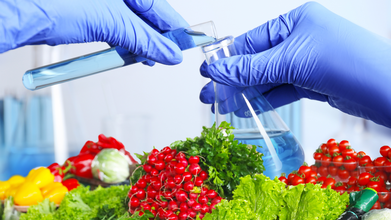
Credits: Canva
Not too long ago, Indore made headlines in water contamination case where a 67-year-old woman, identified as Parvati Bai Kondla also showed signs of Guillain-Barré syndrome. Bacteria like E coli. and Klebsiella were found in the water sample of Bhagirathpura, the epicentre of water contamination.
Indore's Bhagirathpura is again on the news, this time for food contamination.
Also Read: Woman Lost Weight On Mounjaro But Her Breasts Didn't Stop Growing, This Is Why...
Indore Food Contamination: What Happened?
Six people have been admitted to a hospital after they consumed contaminated food in Bhagirathpura. At a birthday party in Bhagirathpura on a late Saturday night, 60 people ate the food and some of them developed health problems. Chief Medical and Health Officer (CMHO) Dr Madhav Hasani stated on Monday.
Bhagirathpura was the epicentre of water contamination that claimed 22 lives earlier. The minister said that affected individuals were treated and as a precaution, six of them were admitted to the Government Maharaja Yashwantrao Hospital.
Indore Municipal Corporation Commissioner Dilip Kumar said, “We have found that in case of the construction of the toilet, no safety tank was constructed beneath it. We are also probing the other lapses.”
As per the official statement, all patients are doing well after the treatment.
Indore Food Contamination: What Happened In Indore Before?
Earlier in January, Mayor Pushyamitra Bhargav reported that due to lapses in civic infrastructure. Investigation revealed that a toilet constructed directly above a main drinking pipeline near a police outpost, without a mandatory safety tank resulted in the sewage mixing with drinking water.
Read: Sewage Mixing With Drinking Water Kills 7 in Madhya Pradesh’s Indore, Over 100 Remain Hospitalized
Speaking to The Indian Express, Indore Municipal Corporation Commissioner Dilip Kumar said, “We have found that in case of the construction of the toilet, no safety tank was constructed beneath it. We are also probing the other lapses.”
What Is E. Coli Bacteria?
Escherichia coli, commonly known as E. coli, refers to a group of bacteria that naturally live in the intestines of humans and animals. Most of these strains are harmless and even play a role in digestion. However, certain types can trigger illness when they enter parts of the body where they do not belong or release harmful toxins.
These disease-causing strains attach themselves to body cells and produce toxins, leading to infection and inflammation.
What Is Guillain-Barré syndrome?
Guillain-Barré syndrome is a rare autoimmune condition in which your immune system attacks your peripheral nerves, leading to symptoms like numbness, tingling, and muscle weakness that progress to paralysis. However, with treatment, most people fully recover from the condition.
Doctors say GBS occurs at any age, but it most commonly affects people between 30 and 50 years of age.
Guillain-Barré syndrome is rare. About 100,000 people worldwide develop GBS every year. To put that into perspective, the world population is about 7.8 billion. That means healthcare providers diagnose GBS in about 1 in 78,000 people each year.
Horlicks Controversy: Why Is This Popularly Branded 'Health' Drink Suddenly Under The Scanner In Odisha

Credits: ANI and Horlicks Website
Branded as a health drink, Horlicks has come under the scanner in Odisha as the government raised alarm over the growing incidence of food adulteration. On Monday, Odisha's Health Minister Mukesh Mahaling revealed that adulterated batches of Horlicks were seized from multiple districts. He raised serious concerns over food safety across the state.
This came in the backdrop of Congress MLA Tara Prasad Bahinipati asking for clarification on reports of food adulteration. The attention was focused on the everyday food products consumed by households.
Also Read: Fact Check: Should You Change Your Underwear In Every 6 Months?
Horlicks Controversy: Adulteration In 'Health' Drink
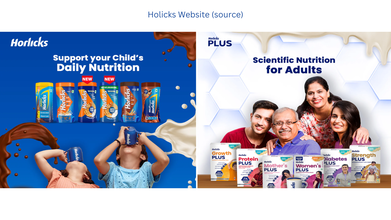
Mahaling responded to MLA Bahinipati's query in the Assembly and said that batches of Horlicks have been seized from Baugh and Dhenkanal districts. Furthermore, other reports of confiscation also came form Jagatsinghpur and Mayurbhanj.
Officials have conducted inspections and seized suspect stock during routine checks, however, the Minister did not specify the exact quantity of the adulteration involved, neither the nature of adulteration was revealed.
This has triggered concerns among the consumers who are parents of young children and elderly citizens who regularly rely on health drinks like Horlicks for nutritional supplements.
Horlicks Controversy: Adulteration In Other Food Items
The Minister said that adulteration is not just limited to packaged health drinks, but has affected a wide range of commonly consumed food items:
- Chhena
- Curd and milk
- Bread
- Spices
- Chhatua
- Sauces
- Soybeans
- Ghee
- Salt
- Sugar
- Papad
- Chocolate
- Maida
As per the Health Department, some samples were found to contain harmful and toxic substances, and severe levels in Khurda district. The Health Minister said that the department has intensified inspections, raids and enforcement measures to curb the malpractice and safeguard public health.
Read: Bacteria Found in Amul Milk Pouches, Officials Urge Pasteurization
'Health' and 'Nutritional' Drink Controversy Case Study
In 2023-24, a controversy on Bournvita, which is marketed as a health drink began when influencer Revant Himatsingka of Food Pharmer alleged in a viral video that the drink contained excessive sugar, which is approximately 50 per cent by the weight. He also said that the drink contained harmful additives and that it contradicted from the marketing of it as a health drink.
Afterwards, a legal notice was sent to Mondelez-owned Cadbury and Bournvita reduced its added sugar content by 14.4 per cent and faced regulatory orders to remove the "health drink" tag from its packaging.
These Fruits Have The Least Sugar In Them
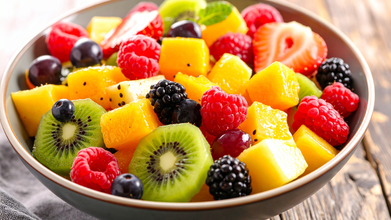
Credits: Canva
Trying to cut back on sugar does not mean you have to give up fruit. Many people assume fruits are automatically “too sugary,” especially if they taste sweet. In reality, quite a few fruits are naturally low in sugar while still packed with fiber, vitamins and hydration. The trick is choosing wisely.
Here are some delicious fruits that satisfy your sweet tooth without sending your sugar intake soaring.
Citrus Picks That Barely Have Any Sugar
If your goal is minimum sugar, citrus fruits are a great place to start.
Lemons and limes top the list. They are intensely sour for a reason. A lime contains roughly 1 gram of sugar and a lemon about 2 grams. Add them to water, salads or chutneys for flavor without sweetness overload.
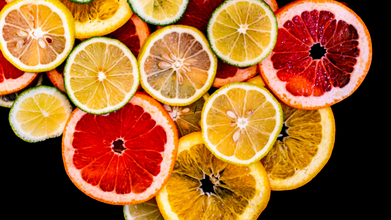
Grapefruit is another excellent option. Half a grapefruit has just around 10 grams of sugar and works perfectly as a refreshing breakfast fruit.
Oranges taste sweet but are still moderate in sugar. One medium orange contains about 14 grams along with a strong dose of vitamin C, making it a far better snack than packaged juice.
Berries: Naturally Sweet And Light On Your Body
Berries are among the best fruits for people watching blood sugar.
Raspberries have just over 5 grams of sugar per cup and a lot of fiber, which helps you feel full longer.
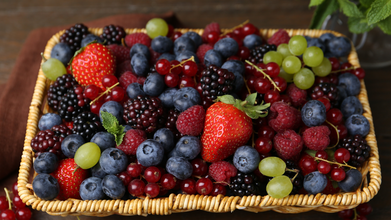
Strawberries come next. A full cup contains about 7 grams of sugar and more vitamin C than many citrus fruits.
Blackberries also sit at roughly 7 grams per cup and bring powerful antioxidants to the table. They are filling, tart and ideal for evening snacking.
Fruits That Hydrate You
Some fruits taste dessert like but are mostly water.
Watermelon is a summer favorite and surprisingly light. One cup contains under 10 grams of sugar and plenty of hydration.
Cantaloupe is slightly higher but still reasonable at under 13 grams per cup. It is rich in vitamin A and works well as a cooling midday snack.
Everyday Fruits That Help You Stay Balanced
You do not need exotic produce to eat smart.
Peaches contain less than 13 grams of sugar in a medium fruit and satisfy dessert cravings naturally.
Kiwis have around 6 to 7 grams per fruit and offer a strong vitamin C boost.
Avocado, also makes it to the list, it is technically a fruit and one of the lowest in sugar overall at about 1 gram in a whole fruit. Its healthy fats keep you full for hours.
© 2024 Bennett, Coleman & Company Limited

